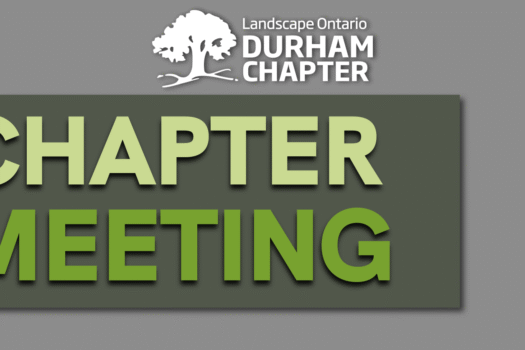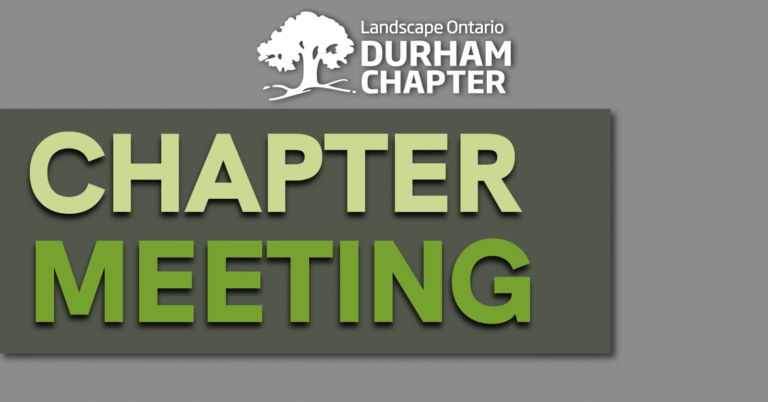The Landscape Ontario Toronto Chapter Bursary Program was initiated in 2017 to enhance the opportunity for those who may not have private gardens to cultivate, or who want to garden in the community. The bursary distributes $15,000 in amounts up to $1,500 for greening projects that contribute to environmental and social wellness.
This year’s committee members included Skai Leja, David Milne and Matt Gove.
The intent of the bursary program is two-fold: to encourage and support worthy greening activities in communities, and to promote Landscape Ontario’s Green for Life brand. This year, the program received requests for support of community gardens, pollinator plantings, native plant gardens, laneway rehabilitation projects, as well as organizations that in turn support all these activities through sharing of knowledge and resources.
Applications were accepted until March 29, and were required to include a clear vision of community benefit from the project; a viable implementation plan, including a realistic budget; a strong, experienced team of engaged volunteers and ongoing maintenance planning. In many cases, the projects reflected long-term engagement by dedicated community members, and it was gratifying to committee members who reviewed the funding requests to be able to support these enterprising groups.
Congratulations to the 2020 Toronto Chapter Bursary recipients:
Mashkiki gitigaanan
Medicine Gardens, in Anishinaabemowin, is a project focused on strengthening urban Indigenous relationships to land through growing plant medicines, such as ceremonial tobacco, and learning how to work with them. The bursary request was to support tobacco planting workshops, a 3-sisters garden workshop, distribution of growing supplies to almost 30 community members and, in the fall, harvesting and processing of medicines, to be used in community ceremonies.
Native Child and Family Services of Toronto (NCFST)
This organization serves the urban Aboriginal community. The bursary will support a couple of healing and therapeutic garden projects, one at a Scarborough storefront location, the other at a more central location that serves as a safe house for women and families dealing with trauma and poverty. Tools, materials, seeds and plants are among their priority acquisitions.
Crooked Farmz
A microbrewer of quality aerobic compost teas for home vegetable gardens and perennial beds, the LO bursary will be used to provide components and materials needed to make compost tea through community workshops. Participants will learn the what, how and why of making and using compost tea to build healthy soil.
Frankland Community School, School Garden St. Marguerite Bourgeoys Elementary School, Selwyn Public School
Three school projects stood out for their commitment and advance preparation documented in their applications. Strong school staff and community support give hope that the gardens will be maintained through their critical first summers, a chronic challenge for school projects. One of the projects, Selwyn Public School, had been previously designed and installed by an LO company, but is in need of a reboot after years of neglect. Grant funds are typically spent on soil amendments, plants and mulch, and in some cases, used to create raised beds.
Black Creek Community Farm
This unique, eight-acre ‘Farm Park’ serves as a community teaching garden that is part of the historic heritage village complex. The bursary funds will help to add edible mushroom grow logs which are to be part of a Forage Trail through part of BCCF’s food forest, adding an intriguing element to their environmental stewardship programming.
The Community Garden at 280 St. George
This resident-initiated and -managed community garden behind an apartment building has turned a little-used turf area into four productive garden beds, providing harvests to participants and enjoyment to all residents. This year, organizers hope to add a pollinator plot to the area.
West Bend Residents Association
This longstanding group of residents in the west end Junction area of the city have greened a number of neglected public spaces over a period of 20 years. This year, they hope to expand their efforts to private properties in the area to build a network of native pollinator gardens that will connect the larger spaces they have previously improved. The effort is part of the Carolinian Canada ‘In the Zone’ initiative. Native plants and mulch are their primary needs.
Sistering
Sistering is a multi-service agency for at-risk, socially-isolated women and trans people in Toronto who are homeless or precariously housed. This project seeks to enhance the mental and spiritual wellness of participants and community members, by transforming a public park space that will be shared to meet a common good. This will lead to increased and visible community collaboration and a better understanding of the importance of shared community spaces.
Kenwood/Wychwood Laneway Gardens
A local mural artist has lent her talents to reduce graffiti and vandalism in her neighbourhood laneways by painting garage doors with beautiful images and working with residents to install little pocket gardens in empty patches of soil. LO’s support will allow the project to expand their reach.
Forest Hill Village – Bilton Laneway
Over a number of years, an increasing number of residents in three adjacent low-rise apartment buildings in Forest Hill Village with no other outdoor space have reclaimed, cleaned and greened an orphaned section of Bilton Laneway and turned it into a quiet oasis. Soil has been painstakingly built-up over underlying asphalt and in large donated containers, which now support an expanding colony of native and edible plants. This year’s bursary will provide the luxury of a soil and mulch delivery.
Community Health Centre Garden
This visible corner site in the east end of the city has been used as a demonstration garden by the Health Centre for some years. The site promotes low-water, no pesticide, native plant gardening, and includes a green roof on a maintenance shed. The goal is to add better educational signage that explains the garden and its many health and global sustainability benefits.
Davenport-Perth Neighbourhood and Community Health Centre (DPNCHC)
This group requested funds to rejuvenate an older Healing Garden that has changed significantly over the 22 years since it was first installed. It is hoped that restoring the original Butterfly Garden near an existing rail corridor will make it part of a longer biodiversity pathway. Bursary funds will help to restock tools and purchase new plants.
The Jean Augustine Centre for Young Women’s Empowerment (JAC)
Providing free after-school and camp programs and workshops to 200 young girls aged seven to 17 in Etobicoke, the bursary funds will be used in support of JAC’s Farm to Table Community Garden program, which includes a cooking and nutrition program, as well as selling garden produce through their social entrepreneur market. Market proceeds are reinvested in the community garden.
Toronto BIAs
Three west end Toronto BIAs: Bloordale, College Promenade and Queen West stood out from others for their association with a social enterprise organization, Parkdale Green Thumbs, which implements street planting programs and exhibits a strong commitment to using native plants and promoting sustainable landscaping practices.
Updates on these projects will be shared on the Toronto Chapter’s Instagram page and LO’s social media platforms. Through participating in chapter fundraising efforts, LO members can take pride in knowing they have helped to contribute to supporting these deserving projects.









